LSU Health Medical Students Go to Washington
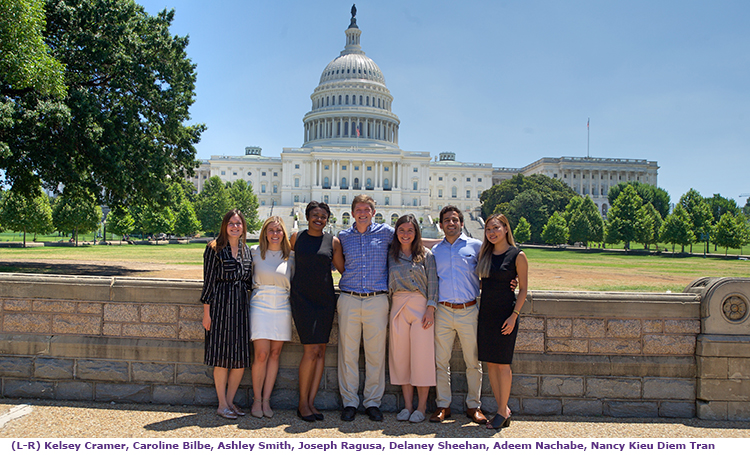
“As I was considering summer options, I came to the realization that this was my ‘last summer’ until I retire,” recalls LSU Health New Orleans second-year medical student Kelsey Cramer. “I felt compelled to do something big and different and exciting.”
An opportunity few medical students get checked all the boxes. Cramer was one of seven fellows in the AmeriHealth Caritas Health Policy Fellowship Program at LSU Health New Orleans schools of Medicine and Public Health who spent eight weeks in Washington, DC, this summer learning the answers to questions like: What is a physician's role in public health? In health policy? What factors will shape how physicians can care for their patients and improve the health of the communities they serve? How can physicians improve population health and health care quality? How do disparities affect health and what can be done to address them? The fellows are all members of the LSU Health New Orleans School of Medicine Class of 2021.
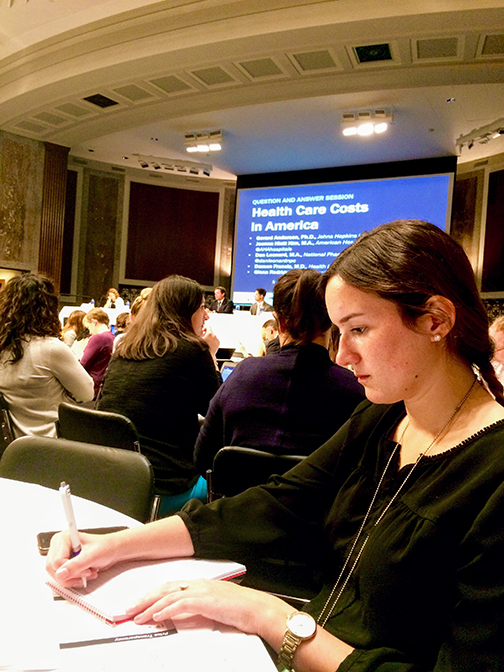
“I spent half of my time attending seminars, hearings, and briefings all over Capitol Hill on topics ranging from medical nutrition to the future of artificial intelligence in health care,” says Cramer. “The other half I spent researching and writing a product that will be distributed to members and staff of Congress. For my product, I selected a topic that is relevant to today's policy concerns and is also relevant to my experiences as a medical student – Emergency Department Utilization and Flow. Emergency Department crowding and costs affect hospitals all over the country, including the hospitals that are affiliated with LSU. I hope to be able to continue to learn and work on this issue in New Orleans.”
It was an eye-opening experience that broadened both her knowledge and perspective.Cramer’s agency was just as pleased with her.
“Thank you for sending us another excellent fellow this summer to help us with our policy work. . ."
Matthew Berry, CRS
Peggy A. Honoré, DHA, AmeriHealth Caritas-General Russel Honoré Endowed Professor at LSU Health New Orleans School of Public Health and School of Medicine, started the fellowship three years ago. Primary goals of the fellowship include advancing the student's understanding and abilities for influencing and setting federal, state, and local health policy agendas with emphasis on policy issues that impede the improvement of quality, reduce cost and eliminate disparities.
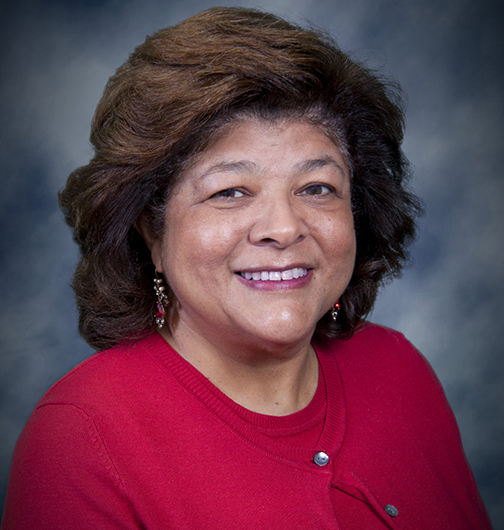
“For example, a former NFL football player who is now an LSU Health New Orleans medical student was placed on the Congressional Committee that was holding hearings on the problem of concussions for grade school, high school, and college students, as well as NFL players,” Honoré says.
Addressing Disparities2018 fellow Adeem Nachabe worked at the Association of Community Affiliated Plans (ACAP). Nachabe researched rising maternal mortality and morbidity rates in the United States.
“Since 2000, these rates have been rising in almost every state in the country. This issue has been disproportionately affecting women of color, who suffer from maternal mortality 3-4 times more and have a higher case-fatality rate from pregnancy-related illness. As part of my research, I studied why these rates are increasing, the cause behind the racial/ethnic disparity, possible solutions to the issue, and what ACAP-member safety net plans are doing to quell the rising trend. I attended forums with presentations from non-profits and members of Congress attempting to craft solutions to this issue. This project has strong implications for my future as a practicing physician. Throughout my work, I have learned how health outcomes can be improved beyond treating the immediate physical ailment.”A detailed understanding of the ins and outs of how safety-net health plans work will make him a more effective physician.
Nachabe was also there to see his agency grapple with a significant change in a policy affecting its operations.
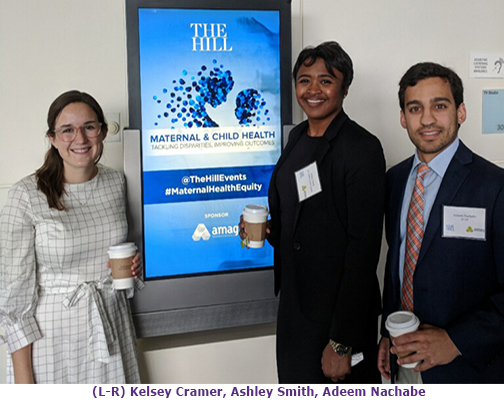
Expanding Horizons
Honoré placed Joseph Ragusa at the National Academy of State Health Policy, where he worked in the prescription drug pricing division. The non-partisan, non-profit organization works to help states address health policy issues including rising drug prices.“I went to Senate committee hearings, wrote blogs about current state legislation and brainstormed with the prescription drug pricing team on how to better help states lower prescription drug costs. Learning about the laws and regulations that affect patients, especially ones related to the rising cost of prescription drugs, allowed me to better understand their circumstances, which will make me a more compassionate physician.”
Delaney Sheehan worked on Latino health at the National Hispanic Medical Association.“I represented NHMA at events concerning health issues like liver disease, mental health and sexually transmitted diseases, just to name a few. I also attended hearings on Capitol Hill on both the Senate and House sides on topics including the 340B program and prescription drug prices in the presence of Secretary of Health and Human Services Alex Azar. Following these events, I wrote summary reports for my organization and drafted calls-to-action for our website and social media asserting NHMA's positions on the various topics. I wrote statements addressing proposed bills in Congress that had the potential to impact the health of Hispanics and worked with NHMA partners to submit comments either commending or opposing pieces of legislation.”
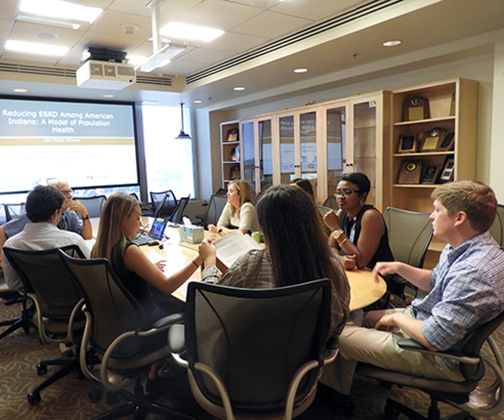
“Outside of policy work, I wrote a post for NCSL's blog and helped them re-vamp their website,” Tran says.
“The partnership between NCSL and the LSU Health Policy Fellowship Program allowed us to elevate NCSL and LSU's presence with our federal partners, work on projects combining the fellow's medical studies with health and human services policy . . "
Haley Nicholson, NCSL“The first thing that the Senator and his aides did when meeting me was to ask me about my interests.” Smith says. When she answered determinants of health, she was paired with staff working on maternal and fetal mortality rates, Medicare and Medicaid, factors that drive up prescription drug prices and the opioid crises.
Senator Cassidy looks at the program as in investment. “Our country benefits when smart, young people get engaged in government. Doctors serve our communities in the examination room; and I've found that as a Senator, you can use that experience to improve your community with wise public legislation,” says Cassidy. “This program gives the next generation of doctors an understanding of the connection between patients and policy.”
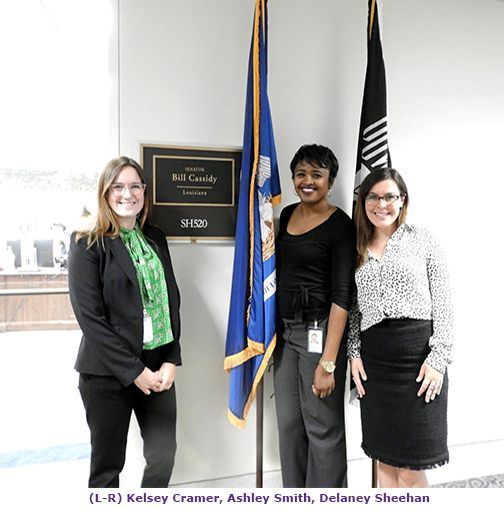
A Healthier Louisiana
So far, 19 LSU Health New Orleans medical students have participated in the program.“Some have continued work on policies once they return to campus,” reports Honoré. “One student who worked on the problem of opioid addiction in big cities continued her work on this topic with physicians on campus and is a co-author with them on papers that provide guidelines for opioid prescribing. Another student is currently seeking to be engaged with health policy in the city of New Orleans.”
Funding from AmeriHealth Caritas Louisiana supports the fellowship program, which includes travel expenses, housing and transportation, and also includes a stipend for each student.“AmeriHealth Caritas Louisiana is demonstrating through action that they have a vested interest for providing expanded educational opportunities for the future physicians of Louisiana,” says Honoré. “Policy is a cornerstone of public health, and population-based policies, such as smoking laws, seat belt laws, and access to care laws have benefits that far exceed interventions targeting one person at a time. The fellowship provides the medical students with concrete hands-on experience about something that will impact the context in which they practice medicine. They learn how policy can be influenced through advocacy and how they can inform lawmakers about health problems that need attention. I hope that some will rise to health policy leadership roles in the state as well as in the nation's capital. I hope that they will use this health policy knowledge to improve conditions in the state of Louisiana to raise the state up from being ranked 49th in health status in the nation.”
